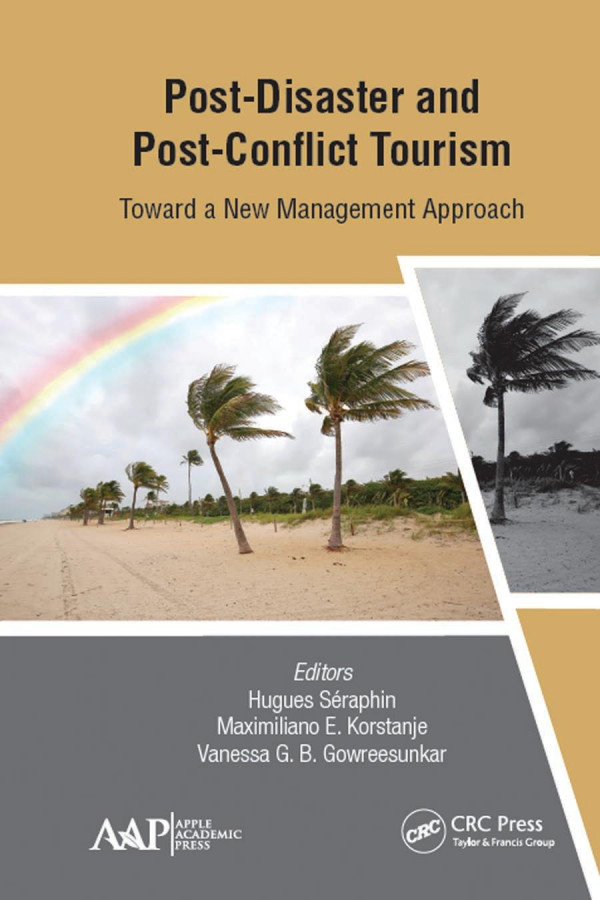

Most ebook files are in PDF format, so you can easily read them using various software such as Foxit Reader or directly on the Google Chrome browser.
Some ebook files are released by publishers in other formats such as .awz, .mobi, .epub, .fb2, etc. You may need to install specific software to read these formats on mobile/PC, such as Calibre.
Please read the tutorial at this link. https://ebooknice.com/page/post?id=faq
We offer FREE conversion to the popular formats you request; however, this may take some time. Therefore, right after payment, please email us, and we will try to provide the service as quickly as possible.
For some exceptional file formats or broken links (if any), please refrain from opening any disputes. Instead, email us first, and we will try to assist within a maximum of 6 hours.
EbookNice Team

Status:
Available4.8
36 reviews
ISBN 10: 0429276222
ISBN 13: 9780429276224
Author: Hugues Seraphin, Maximiliano Korstanje, Vanessa G B Gowreesunkar
Post-disaster and post-conflict tourism has recently emerged as a prominent topic of research and considers new risks that jeopardize tourism travel to destinations that have recently experienced climate-related disasters, civil conflicts, and other challenges. This volume presents a host of innovative strategies that could be adopted by post-colonial, post-conflict, and post-disaster destinations to encourage travel and tourism in these areas.
Policymakers are focusing their efforts on identifying and eradicating external and/or internal risks in order to protect the tourism industry in their regions, in line with a new spirit that is clearly orientated toward mitigating risks. This capacity of adaptation suggests two important things that are at the heart of this book. On the one hand, tourism serves as a resilient mechanism that is helping destinations in their recovery strategy. On another hand, this raises ethical issues related to tourism consumption.
Part 1: Tourism and Geopolitics
1. Tourism as a Vehicle Toward Recovery
Maximiliano E. Korstanje
2. The Unsettling Rage and Fury Associated with Consuming Post-Disaster Space(s)
Maximiliano E. Korstanje and Babu George
3. Educating Tourists at the Pre-Visit Stage
Hugues Seraphin
Part 2: Post-Colonial, Conflict, And Disaster Destinations
4. Post-Colonial Branding and Self-Branding in a Destination Marketing Strategy
Xavier Guegan and Hugues Seraphin
Part 3: Consumption in Post-Colonial and Conflict Destination
5. Global Branding Strategy and Framework
Hugues Seraphin
6. Global Branding Strategy and Framework Exploring the Potential of Street Food as a Sustainable Livelihood Tourism Strategy for Developing Destinations
Manuela Pilato, Hugues Séraphin, and Anca Yallop
7. Unlocking Changes for Sport Tourism Products Using the Blakeley-Visser Model: An Application to Sporting Events in Small Islands: The Case of Martinique
Hugues Seraphin and Vanessa GB Gowreesunkar
8. The Future of Post-Colonial, Conflict, and Disaster Destinations: Myths and Reality
Maximiliano E. Korstanje
9. Food Events and Destination Image: A Corollary Note
Hugues Seraphin and Vanessa GB Gowreesunkar
Part 4: A Commoditized World
10. The Commoditization of Security Guards in the Tourism Industry: The Case of Argentina
Maximiliano E. Korstanje
11. The Ethics Revolving Around Post-Disaster Consumption
Maximiliano E. Korstanje and Hugues Seraphin
12. Genocide Suffering and Global Capitalism
Maximiliano E. Korstanje and Hugues Seraphin
13. Introduction, Conclusion, and Epilogue
Maximiliano E. Korstanje, Hugues Seraphin, and Vanessa GB Gowreesunkar
post-disaster and post-conflict
post-conflict
post-conflict and disaster management
post-conflict reconstruction
post-conflict and post-disaster states often have concerns over
post-conflict state
post-conflict recovery
Tags: Hugues Seraphin, Maximiliano Korstanje, Vanessa G B Gowreesunkar, Disaster, Conflict